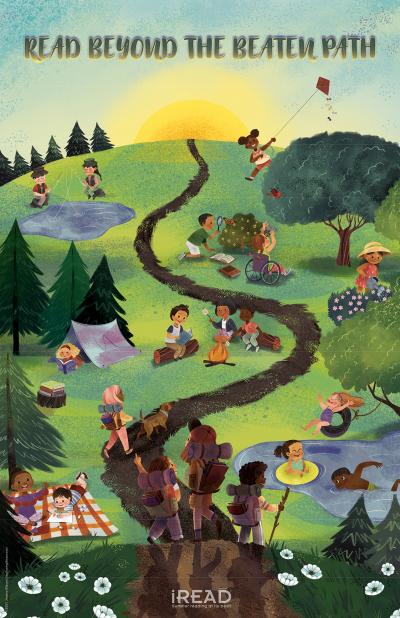A long time ago, in a library far, far away, someone suggested the first "summer reading" program, and for a LONG time, that is exactly what most library summer programs consisted of - reading. Nothing more, nothing less. Different programs count pages or days or minutes, but reading has been at the heart of these programs for decades.
Recently, there has been a shift in how libraries approach summer. Summer programs are no longer just about reading. Some libraries offer meals, especially for those students who rely on school food options during the school year. Some libraries offer programming similar to traditional day camps, where students can spend the entire day reading, making crafts, or playing games. Library day camps can offer a low- or no-cost childcare option to parents who might otherwise be hard-pressed to find affordable care. Even traditional "summer reading" programs are expanding to include options above and beyond just reading. Special performances, unique maker opportunities, and more present families with a wider variety of options for time at the library over the summer.
If you are beginning the process of fine-tuning your summer reading program, why not switch it up? Consider offering a summer learning program instead. You can still establish reading goals, but add a variety of performances, activities, crafts, or events to your overall program. Give families a variety of ways they can earn credit toward completing your summer program above and beyond just reading. And make your program one that welcomes the whole family, not just the kids. According to the Beanstack 2021 Summer Reading Report, 88% of the top-performing libraries offered programming for all ages. If the kids see their parents and caregivers modeling reading behaviors, the kids are more likely to read themselves. By offering family-friendly programs and activities, everyone can enjoy your presentations together.
If you are not sure about what kinds of activities to offer, here are some suggestions:
- Activities that promote digital library resources - Give special credit for reading e-books, audiobooks, or accessing your library's digital databases.
- Outside performers and presenters - Let patrons earn badges or prizes for attending a program, performance, or presentation.
- Honor System activities - Suggest activities individuals or families can do outside the library related to your program's theme. Let them self-report their participation. For "Reading Beyond the Beaten Path," activities might include a visit to local hiking trails, botanical gardens or nature preserves, or just reading outdoors.
- Encourage service - Partner with community service providers to create opportunities for your patrons to volunteer their time or donate goods or money. Dropping off canned goods for the food pantry, walking dogs at the animal shelter, or assembling toiletry kits for the homeless shelter are some possibilities.
- Put it to the test - Use platforms like Kahoot, Quizizz, or even Google Forms to create themed quizzes and trivia tests.
Shift your focus to the different ways people learn, not just what, when, or how they read. If you present a more rounded summer program, with a wider variety of opportunities for engagement and interaction, your patrons are going to be more likely to join the program and stick with it.
Today's guest blog post is by Donna Forbis, Marketing and Events Coordinator, Illinois Prairie District Public Library


